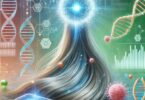Neoplasia is the abnormal formation of a tissue of a tumorous nature, also called a tumor or cancer; that is, any uncontrolled growth of abnormal cells or tissues in the body.
There are two types of neoplasms, they can be benign (not cancer) or malignant (cancer). In the case of the benign ones, these sometimes grow a lot, but they do not spread, nor do they invade nearby tissues or other parts of the body. It is produced independently of the rest of the tissues. The neoplasia can be asymptomatic, especially if it is benign or generates alterations in the organism.
A malignant neoplasm can grow rapidly, spread, and cause damage in the body. Also, it can metastasize, this is when cancer cells spread throughout the body, it can come back after surgical removal, and invade and destroy surrounding tissues.
There are four types of benign neoplasms: Papilloma: a more protruding mass on the skin, for example, a cyst. Adenoma: a tumor that grows in and around the glands. Lipoma: tumor in adipose tissue. Osteoma: tumor originating in the bone.
They are diagnosed through laboratory tests, including blood tests or tissue samples to detect the presence of tumor markers. When there is a malignant tumor present in our body, even when no visible symptoms have yet appeared, changes in the blood structure occur. Red blood cells constantly switch in healthy people, but in the presence of a cancerous abnormality, this occurs to a greater extent.
What causes the Neoplasia is excessive exposure to sunlight, excessive alcohol consumption, do not consume tobacco, environmental toxins such as poisonous mushrooms and a type of toxin that can form in peanut plants (aflatoxins). Genetic problems.
Symptoms:
Weight loss without apparent cause;
Persistent cough;
Fever;
Painful urination or dark urine;
Intense tiredness;
Emergence of nodules, especially in the breast.
Appearance of spots on the skin.
The most common treatments are surgery, chemotherapy and radiotherapy. Newer options include targeted therapy, immunotherapy, and laser hormone therapy, among others.
It is recommended in these cases: Eat a healthy diet, maintain a healthy weight and do physical activity. Consume many red fruits such as: blueberries, raspberries, currants, due to the content of antioxidant compounds such as polyphenols that reduce and repair damage to cells, as well as being rich in vitamin C.
You should avoid consuming the following:
Smoked foods, fats, caloric excess, coffee, alcohol, artificial sweeteners, cholesterol and bile salts, food preservatives, nitrates, nitrites and nitrosamines.
https://www.google.com/search?q=enfermedades+neoplasmas&sxsrf=AJOqlzUhEnaJBNPwSwo0zgEkhvck8LjSzQ%3A1674644877088&ei=jQ3RY5n2BJGvqtsPsqWIsA8&ved=0ahUKEwjZ8JeoyuL8AhWRl2oFHbISAvYQ4dUDCA8&uact=5&oq=enfermedades+neoplasmas&gs_lcp=Cgxnd3Mtd2l6LXNlcnAQAzIHCCMQsAMQJzIHCCMQsAMQJzIHCCMQsAMQJzIKCAAQRxDWBBCwAzIKCAAQRxDWBBCwAzIKCAAQRxDWBBCwAzIKCAAQRxDWBBCwAzIKCAAQRxDWBBCwAzIKCAAQRxDWBBCwAzIKCAAQRxDWBBCwA0oECEEYAEoECEYYAFC7BVjIGmCGH2gBcAF4AIABAIgBAJIBAJgBAKABAcgBCsABAQ&sclient=gws-wiz-serp








